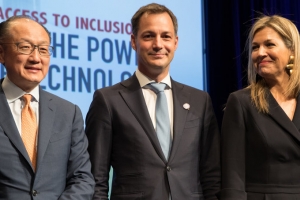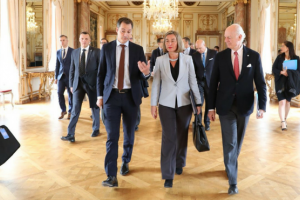Belgium invests in blockchain technology for cash-based transfers in refugee camps
Belgium will financially support the World Food Programme’s roll-out of blockchain technology for cash-based transfers in refugee camps. Deputy Prime Minister and the Minister for Development Cooperation and Digital Agenda Alexander De Croo announced the collaboration during a working visit to the United Nations in New York. Belgium is investing twenty million euros in total this year in innovation to improve humanitarian assistance.
WFP delivers millions of tons of food each year to people in humanitarian need. The assistance comes increasingly through cash-based transfers that allows people to buy food in the market and be in charge of key decisions that affect their lives. This approach improves the self-sufficiency of refugees, maximizes the number of people that can be reached and strengthens the local market, even in times of crisis.The largest program for cash-based transfer is the one for Syrian refugees.
Safer, more transparent and lower payment costs
By implementing a blockchain, WFP aims to make these cash-based transfers more efficient, safer and more transparent. The use of blockchain also lowers the payment cost. Last year, a large-scale pilot program was rolled out in the Azraq refugee camp in Jordan. More than 330,000 transactions for 100,000 beneficiaries were processed via blockchain. With the support of Belgium, WFP will now roll out the use of blockchain, for all the 500,000 Syrian refugees who are residing in refugee camps in Jordan, by the middle of this year.
Deputy Prime Minister Alexander De Croo announced the collaboration during a working visit to the United Nations in New York where this week the World Creativity and Innovation Week is taking place. Together with Mozambique, Belgium organised a side-event and panel discussion onLeveraging Innovation for Humanitarian Action with representatives of the World Food Program, the International Committee of the Red Cross (ICRC) and UNICEF. Mark Lowcock, the UN humanitarian coordinator, was guest of honour during the event.
Saving more lives through innovation
Alexander De Croo: "Due to the many protracted conflicts and climate change, the number of people needing humanitarian assistance has risen sharply in recent years. This year, more than 128 million people across the world will need humanitarian assistance and protection. This is triple the number of three years ago. By focusing more on innovation, we make humanitarian aid more effective and save more lives. The use of blockchain is a perfect example of this.”
Mark Lowcock, Under-Secretary-General for Humanitarian Affairs and Humanitarian Relief: “From blockchain-based financing to advances in data science, digital technology is having a profound impact on humanitarian action. We need to find out what works and what doesn't - a positive transformation in the lives of a hundred million people caught up in crises is possible if we spread the best ideas effectively”.
During the panel discussion a series of other innovations, in which Belgium invests, were reviewed. The WFP’s development of humanitarian drones was outlined and the groundbreaking UNICEF project, named the U-Report, was presented to the public. U-Report assesses via text messages and social media the actual necessities and needs of populations in crisis areas. On the basis of aggregated data, the humanitarian community can then respond more adequately to the real needs of the population. With Belgian support, UNICEF wants to reach the affected population in the North-East of Nigeria, an area plagued by Boko Haram, more efficiently.
In total, Belgium will invest 20 million euros in humanitarian innovation in 2018. Seven million euros will go to multilateral humanitarian organizations such as WFP, UNICEF and UNHCR, 13 million euros to innovative solutions provided by NGOs.


